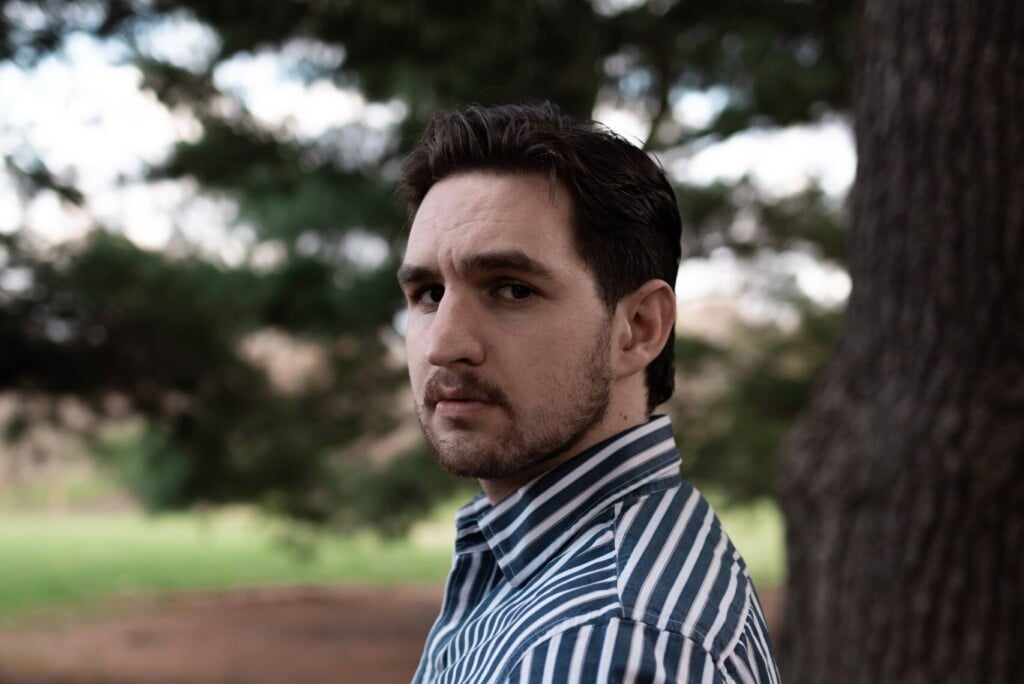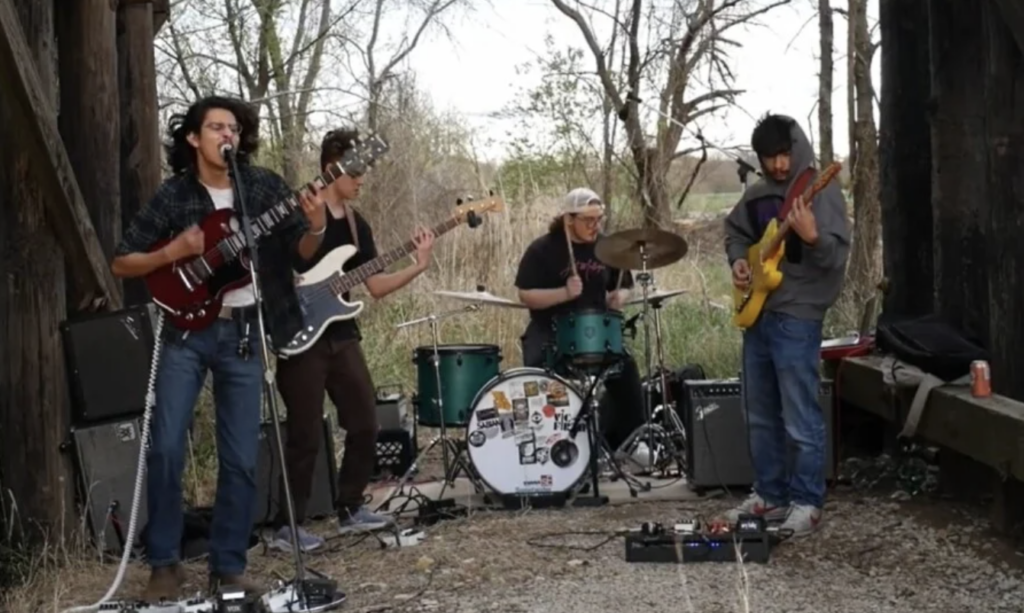New Zealand indie pop-rock sensation The Beths head west for Boulevardia
Lead singer Liz Stokes talks tour life, songwriting, and why "depressing" self-disclosure has a place in their fun, upbeat music.
On their next stop in their 6-month global tour, The Beths will add their honest, emotionally intelligent power-pop spin to Boulevardia’s music lineup Friday night.
Following the release of their third studio album, Expert in A Dying Field, this will be the band’s first time back in Kansas City since their 2019 show at recordBar. Released in September, the 12-track album was highly anticipated following the success of their first two albums, Future Me Hates Me (2018) and Jump Rope Gazers (2020). It debuted at #1 on New Zealand’s Top 40 Albums Chart—a large leap from their first Soundcloud releases in 2015 and their meeting at the University of Auckland.
Following the release of Expert the quartet has caught large U.S. media networks’ attention, making appearances on NPR’s ‘Tiny Desk’ concert series and CBS Saturday Morning in March.
View this post on Instagram
Still, Stokes—who is the frontwoman and main songwriter for the band—says their progression in stardom has not been overly jarring but an organic part of their story. They consider touring before live audiences an important part of their identity as a band and maintain a rigorous tour lineup—57 cities in 6 months, to be precise.
After four stops in France, The Beths are headed stateside to perform at Boulevardia Friday night. Ahead of their show, The Pitch sat down with Stokes to talk about the ups and downs of tour life, writing Expert, and vulnerable lyrics. Stokes also dives into their signature penchant for an unexpected, cathartic cocktail of self-deprecating lyrics with upbeat tunes in their power pop anthems.
The Pitch: So you’re stopped in France right now and have been on this run of touring since the end of May. How has this tour been so far?
It’s been really good. We toured a lot last year, but I guess last year it was still feeling a little weird. Now it feels like touring is starting to feel normal again, for us anyway—so it’s been really nice. This album has reached some new people as well, so it’s been nice to see those people at gigs singing along and stuff. There’s still a lot of touring to go yet this year, but we’ve already done quite a bit. Yeah, we did a big tour of the States in March.
You all have added several new shows to your U.S. tour and are selling out venues in the States. What has it been like to see your fanbase grow internationally and in the U.S.?
It’s awesome. I feel like we had a bit of luck with our first album, in terms of reaching people. We didn’t have a huge fanbase but we got some reach and saw people start coming to shows.
From that point, it just feels like every time we’ve been touring there’s been a few more people. It’s not like we’ve ever exploded into stadiums or anything but it feels like every time we go play the venues get a bit bigger. And it’s been a step up with Expert as well, in a way that still feels organic and nice.
When did you stop in Kansas City last? What has your experience been like?
I’m not sure what year, but it was mid-July or August. We’ve played a lot, so it’s hard to remember. But I do remember playing Kansas City because it’s confusing that it’s called Kansas City, but it’s not in Kansas—it’s in Missouri. And some of these shows in the center part of the states are quite fun for us because they’re a little bit smaller, but the vibe is usually very good. We actually got some “Yeehaws” last time which was really fun.
As the band’s songwriter, what was the songwriting process like for Expert in A Dying Field? How did it differ from your previous albums?
It’s our third album, and every album that we’ve made has been quite a different experience. For our first album, we were back in Auckland just making it in our spare time on weekends or at night. And for the second album, we had just done this big round of touring and then went straight into the studio and made another record and really had to push it out, and turned it in March 2020. Then we were going to go on tour and then obviously didn’t because the world kind of shut down. With Expert, I had more time to write it because I don’t really write on tour very much. And then while we were recording it in 2021, halfway through the recording process, there was a big three-month lockdown in Auckland. At the time, it was really annoying and frustrating because we had a tour coming up in 2022 that we needed to be ready for. But it ended up being a good thing—the album changed quite a lot during those three months when we couldn’t go to the studio or record. So I was just kind of rewriting at home and writing new songs. Some of the songs that were on the album ended up changing, and I feel like it ended up a better album than it was before that time.
Many of your songs have themes expressing self-doubt and have kind of self-deprecating lyrics—”Knees Deep” and “I Told You I Was Afraid” come to mind. Why is vulnerability important in your songwriting?
It seems to be the only way that I know how to write songs. I feel like when I’m writing, I’m usually trying to process something and I’m trying to figure out how to make the feeling that I’m having understood. I guess I really do want to be understood, even if songs are always interpreted differently by people that listen to them. I feel like that’s something that I look for in music as well; I like when it’s something that feels relatable. I always preface this with the fact that this is not the only kind of music that I like. Because there’s all kinds of ways that you can write songs. You can write songs about characters, you can write songs where the meaning is kind of cryptic. But to me, I feel like being understood is important. And I’m usually trying to get something across.
So are your songs usually autobiographical?
Yeah, they usually at least start that way. And then in the finishing of a song sometimes, to make the story better or to make a song work you change things. And I’m okay with that. It’s not 100% nonfiction, but it’s definitely not fully fiction either.
A lot of your lyrics have kind of dark undertones like we discussed, whether they allude to self-consciousness or overthinking—but then you pair them with an upbeat, catchy pop tune. Is this something that just kind of happens? What’s your creative process behind this?
I think it just makes sense to me. When I’m writing, I’m very rarely compelled to write a song about how I’m happy and stable and everything’s fine. It’s not that you have to suffer for your art; I don’t think that’s the case. But I feel like when I’m trying to express something, it’s because of something that I’m having trouble with, it’s something that I’m trying to work through. But then even if it’s depressing, the kind of music that I want to play in a rock band is not, like really sad, or really depressing. The music that I want to play in a band and that I like writing is pop songs or the pop song form. So it kind of just makes sense to me. If I’m going to express myself, even if it’s about something depressing—I want it to be fun.
What does that creative process of songwriting look like for you?
Honestly, it feels like a dream sometimes. Like, you can’t remember afterward, and you’re like, “I did that, but what the hell was I doing when I did that?” I feel like I’ll compile fragments like a lot of songwriters. I’m sure for many songwriters it’s like your voice notes, whatever notes app you have on your phone, and also notebooks that just fill up with fragments and ideas. I feel like I do actually have to sit down and be like, “Okay now I’m going to write the song.” I don’t always end up doing that. But like, I’ll dig in, sift through everything and start to chip away at making a song.
What do you hope listeners get out of your music?
I hope they like it. I hope that they want to listen to it again. And that means a lot when I like an album or a song and I want to play it again. I feel like what happens when you listen to something multiple times in a short period of time is you kind of like attach that song or album to a particular moment in your life. And I like that idea. I like the idea of being kind of woven into people’s lives in some small way. In 20 years’ time, they may hear that song and go, “Ah, I remember where I was at that time.”
What is your favorite part about touring? The most difficult part?
Touring is something that I feel is quite essential for us. It’s an important part of how we see ourselves as a band and it’s an important part of the enjoyment that we get from being a band—touring in front of people and getting tight as a band. So playing the show is the best part of every day and it’s the goal of every day. That’s kind of the nice thing about touring as well—your goals are just very clear. Your goal for the day is to get to the show and play as good a show as you possibly can. And then the worst thing about touring is just not getting enough sleep. Especially when we’re still in a van traveling around Europe. So you finish the show, load up at the venue, you get to the hotel at 1 a.m., 2 a.m., or something like that. Then you get up, go to the lobby at 7 a.m.—or 4 a.m. if it’s a flight—and you just don’t get enough sleep. One night of bad sleep is fine. But after multiple nights in a row, you start to become low-functioning. So that’s probably the worst part. I bet anybody that has a baby and reading this is probably just like “Shut up!”
The Beths are at Boulevardia 2023 this weekend. Come catch ’em with us and say hello.





